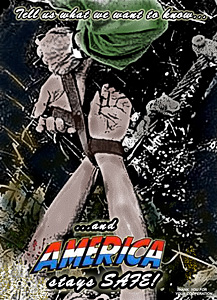Government Trying to Fudge on Its Claim to Absolute Power
I’m working on a post on the news that DOJ will not charge Jose Rodriguez for destroying the torture tapes. But that’s going to take a while (read the NYT on the news in the meantime).
In the meantime, though, I wanted to point to Adam Serwer’s summary of yesterday’s hearing on the Anwar al-Awlaki suit. The most amusing detail in Adam’s story is that the government only wants to rely on its invocation of State Secrets as a fallback position.
Letter explicitly asked Bates to dismiss the lawsuit on state-secrets grounds only as a last resort.
See?!? They have some shame about their abuse of executive power, even if they’re going to rely on it anyway.
The most important issue, IMO, pertains to standing–I have already suggested that Judge Bates might reject the suit for lack of standing, not least because it’s the easiest way to punt. Adam suggests that Bates was thoroughly uninterested in one of two potential ways to establish standing.
The ACLU/CCR contends they have standing under two criteria, “Next Friend” and “Third Party.” Meeting the standard under “Next Friend” requires the ACLU/CCR to show that the younger al-Awlaki would want to sue but can’t, while “Third Party” demands that the elder al-Awlaki show that he would “suffer a concrete, redressable injury” from the government’s actions. Although Ben Wittes, who was also there, would disagree with me, I think Bates was more sympathetic to “Next Friend” than he was to the “Third Party” question, as he warned the latter could lead to a flood of lawsuits based on government action, and an “unprincipled landscape” in which judges arbitrarily decide standing based on the plaintiffs they’re sympathetic to.
But perhaps the most dramatic part of the hearing appears to have been when Jameel Jaffer stood up and stated that this suit was about whether or not the President can order the assassination of a citizen with no review. I actually differ with Adam’s take on some of this.
There was an exchange at the end of arguments that, beyond the legalese, really crystallized what this case is about. Both sides had offered their final rebuttals, but ACLU attorney Jameel Jaffer stood again and stated that the lawsuit was really about whether the president possesses an “unreviewable authority to order the assassination of an American citizen.” It moved Bates to ask Letter if he wanted to respond.
[DOJ Attorney Douglas] Letter rose and called Jaffer’s statement “absurd” and “ridiculous” but what followed was less convincing. He pointed out that the AUMF limits the president to overseas operations, that al-Awlaki was part of an “officially designated” terrorist group who was “attempting to carry out operations” against Americans.The fact that al-Awlaki had just released a new video calling for Muslims to kill Americans probably weighed on reporters in the courtroom.
Only the first of Letter’s statements is beyond dispute. The other two concern unproven — but not necessarily inaccurate — assumptions of fact that go to the heart of the case: whether or not al-Awlaki is actually an “operational leader” of al-Qaeda in the Arabian Peninsula or simply a vicious hatemonger who justifies and exhorts terrorism against Americans. The government is actually saying that its unilateral determination that the latter two assumptions are accurate that allow the government to deprive al-Awlaki of life without due process.
First, note that Letter’s claim that al-Awlaki was part of an “officially designated” terrorist group is a bunch of baloney. He is now part of that group, at least according to the unproven allegations of the government. But the State Department didn’t get around to designating al Qaeda in the Arabian Peninsula as such until several weeks after they had put al-Awlaki on the JSOC kill list (though he was not yet on the CIA kill list), so the suggestion that the President would only target someone formally designated a terrorist for assassination is a lie.
But the other claim–that the AUMF only covers operations overseas–is even sillier.
Consider: the government has not yet withdrawn the White Paper retroactively authorizing the illegal wiretap program under the AUMF. Thus, DOJ still supports claims that the AUMF authorized the President–any President–to conduct operations (in that case, military operations in the form of NSA wiretapping) in the United States.
Mind you, Tom Daschle has made it clear that Congress specifically refused to grant the President authority to operate in the United States. But so long as DOJ supports that White Paper, they stand by a public claim that the AUMF authorized the President to operate within the US.
So Jaffer is right: there’s nothing about Douglas Letter’s claims that rebut Jaffer’s argument that this is about whether the President can unilaterally assassinate an American citizen. As Adam has shown, simply asserting someone is a member of a terrorist organization does not make the assertion any less unilateral. And Letter’s claims that the AUMF does not authorize operations in the United States seems to ignore DOJ policy that supports just such a claim.

